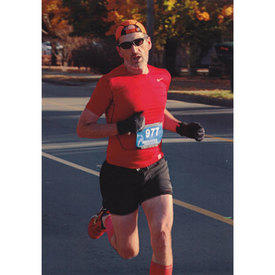Will losing 10 more pounds help my speed much?

Seaduck79
Posts: 35 Member
I'm 55, and recently dropped from 230 to 175 (I'm 6'1"), and am happy and healthy there, largely due to eating less and running more (thank you MFP for a HUGE help tracking all that!). My mileage has increased to about 40/wk, at around 8:00/mile average. Here's my problem:
I want to run a marathon in 3 months, which I know I can do (I ran 20+ last Saturday). The problem is that I want to run it in about 3:30, and the best I could do right now is around 4:00. I'm wondering whether dropping to 165 would help to any measurable degree with dropping another 30 seconds a mile. I don't have any health issues with joints, bones, or muscles right now. I am doing speed work to get faster, and it's helped in getting me to where I am. I also do some light weight work, just to keep my upper body lean and relatively toned.
Just looking for the fastest path to faster running. Ideas, from those who've been where I am going?
I want to run a marathon in 3 months, which I know I can do (I ran 20+ last Saturday). The problem is that I want to run it in about 3:30, and the best I could do right now is around 4:00. I'm wondering whether dropping to 165 would help to any measurable degree with dropping another 30 seconds a mile. I don't have any health issues with joints, bones, or muscles right now. I am doing speed work to get faster, and it's helped in getting me to where I am. I also do some light weight work, just to keep my upper body lean and relatively toned.
Just looking for the fastest path to faster running. Ideas, from those who've been where I am going?
0
Replies
-
Even with my first 10 pounds I lost I felt a lost less stress on my joints and was ablr to move better. It might not seem like a lot, especially in light of the 50+ pounds you already lost, but every little bit helps...to a point I suppose. I know a few top athelete tennis players that dropped 10-15 pounds and comented on the improvement they felt.0
-
I should also say that as a much younger man in my 20s, I was in the 155 range, and felt light and fast. But I'm not sure I'd look as good as a more mature man carrying that little weight.0
-
Every pound of body fat that is gone increases your speed by a certain amount. I don't have the numbers in front of me, but it's significant - like 20 seconds per mile, maybe?
That said, losing lean muscle mass would have the opposite affect. So make sure it's fat and not lean muscle!0 -
I can say, even if I EVER could get down as light as I was when younger, I will most likely never feel as light and fast as I was. Well, I might feel it once or twice, but it would take me a week to recovery from being for light and fast.
 0
0 -
Nothing scientific here, so take this for what it's worth... but my feeling (both logic and personal experience) says that weight can have a noticable impact on endurance (especially in longer races), but a minimal impact on speed.
I've shed a full minute off my half marathon pace by strength training all winter and working on my stride.
Again, FWIW.0 -
Actually it's 2 seconds lolEvery pound of body fat that is gone increases your speed by a certain amount. I don't have the numbers in front of me, but it's significant - like 20 seconds per mile, maybe?
That said, losing lean muscle mass would have the opposite affect. So make sure it's fat and not lean muscle!
So 10lbs would give you 20secs a mile, over 26.2 miles 8.73 min. But thats just theory.
Work on your form instead, that should make you faster.
Ps. I'm not speaking from experience, I'm trying to get faster myself so I've been doing some research.0 -
Yes, as long as you don't lose muscle, then losing 10 more pounds will probably make you faster. It won't be easy, though! I've been trying to lose "10 more pounds" for about the last two months (just to get to 175 -- I am 6'2"; I'm 46). As you get older it gets much harder to lose fat, so it may not even be possible for you to lose 10 more pounds of fat.
I suspect there are probably also improvements in pre-race and during-race nutrition that could help, as would following a regimented training program. There is more to improving your speed than just doing speed work. I have found the Daniels Running System to do wonders for my marathon speed (my PR is 3:23).0 -
Hmmm...I shoulda used some Google magic. Joe Henderson says that 10 lbs. can make 20 seconds/mile difference. That's over half what I need to make, and I think my speed work can make up that difference. The weight loss alone would put my half time around 1:38, and full around 3:40.
Guess I start next week. Thanks, guys!0 -
I'm 55, and recently dropped from 230 to 175 (I'm 6'1"), and am happy and healthy there, largely due to eating less and running more (thank you MFP for a HUGE help tracking all that!). My mileage has increased to about 40/wk, at around 8:00/mile average. Here's my problem:
I want to run a marathon in 3 months, which I know I can do (I ran 20+ last Saturday). The problem is that I want to run it in about 3:30, and the best I could do right now is around 4:00. I'm wondering whether dropping to 165 would help to any measurable degree with dropping another 30 seconds a mile. I don't have any health issues with joints, bones, or muscles right now. I am doing speed work to get faster, and it's helped in getting me to where I am. I also do some light weight work, just to keep my upper body lean and relatively toned.
Just looking for the fastest path to faster running. Ideas, from those who've been where I am going?
Each pound costs 2 seconds.
And, if you're averaging 8 minute miles and your marathon pace is NOT in the 6:30 minute range, you're running too fast. Yup, you should be doing long runs at MP + 90 seconds.
I'd strongly suggest that you get a training plan. You're putting a lot of time and effort into your running and the time spent learning about what runs to do when is time very well spent.
In May I went to the McMillan running camp and got a lot out of it (even though I've been "studying" running for about two year). In fact, we went through the process that Greg describes in his book "You (only faster)". His book has a variety of training plans in it and, more important, it explains why the training plan is set up the way it's set up and it does so in a very readable manner.0 -
Losing some weight might help some but probably not enough to cut over a minute per mile off marathon pace. My recommendation is to not worry about weight BUT to instead get your bodyfat to around 10% and let the weight be what it is. At that point, unless you have a a lot of upper body muscle mass to shed further weight loss will probably slow you down.My mileage has increased to about 40/wk, at around 8:00/mile average.
The second thing is that you can probably meet your goal in the future, if not in the next three months, but you're probably going to need to modify your training to add some mileage at an easy aerobic pace. If you are capable of an 8:00/mi marathon pace then most of your easy run miles should be closer to 9:00/mi than 8:00/mi.
I ran a 3:32 marathon last year at age 53 and particularly in the summer heat my easy runs were all slower than 8:00/mi and in hindsight I was still running most of them too hard. Also, all my long run paces were around 10:30/mi. Those could probably have been faster but I was running with a group.
Easing up on the easy run intensity will do three things. It will target the aerobic adaptions necessary for success. Faster is not better for achieving this. It will leave you better recovered for really hammering the tempo runs and speed workouts. And it will allow you to run more miles without overtraining or injury. More miles = better fitness = faster pace.
If you haven't read them, I recommend these two books. They really lay out the structure and intensity for different types of runs and give good guidance on how to dial in the right pace.
This one contains the science behind all the different types of training that you can do. It also contains tables of paces for every different kind of workout based upon your current fitness as determined by a recent race. This is one of the most well read books in the running world.
Daniels' Running Formula by Jack Daniels http://www.amazon.com/Daniels-Running-Formula-2nd-Jack/dp/0736054928
This one contains marathon training plans that many have used to run their best races and provides good guidance on pacing, particularly if you are training with a HRM..
Advanced Marathoning by Pete Pfitzinger http://www.amazon.com/Advanced-Marathoning-Edition-Peter-Pfitzinger/dp/07360746000
This discussion has been closed.
Categories
- All Categories
- 1.4M Health, Wellness and Goals
- 398.2K Introduce Yourself
- 44.7K Getting Started
- 261K Health and Weight Loss
- 176.4K Food and Nutrition
- 47.7K Recipes
- 233K Fitness and Exercise
- 462 Sleep, Mindfulness and Overall Wellness
- 6.5K Goal: Maintaining Weight
- 8.7K Goal: Gaining Weight and Body Building
- 153.5K Motivation and Support
- 8.4K Challenges
- 1.4K Debate Club
- 96.5K Chit-Chat
- 2.6K Fun and Games
- 4.7K MyFitnessPal Information
- 17 News and Announcements
- 21 MyFitnessPal Academy
- 1.5K Feature Suggestions and Ideas
- 3.2K MyFitnessPal Tech Support Questions






